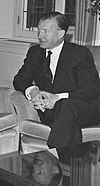Fianna Fáil leadership election, 1979
|
|
||||||||||
|---|---|---|---|---|---|---|---|---|---|---|
|
||||||||||
|
||||||||||
|
||||||||||
The 1979 Fianna Fáil leadership election began in December 1979, when Jack Lynch resigned as party leader and Taoiseach. Lynch had been party leader for thirteen years and Taoiseach for over nine years. His successor was elected by the members of the Fianna Fáil parliamentary party on 7 December 1979. After one ballot the election was won by Charles Haughey.
Following a landslide election victory at the 1977 general election the fortunes of Jack Lynch had turned around completely. The economy began to deteriorate, internal divisions within Fianna Fáil became apparent, party discipline and morale was beginning to break down as pressure mounted on Lynch to step aside. Perhaps the biggest blow to the Taoiseach's confidence came when the party lost two by-elections in November 1979, one of which was in Lynch's native city of Cork.
Upon hearing this, Lynch decided that the time was right for him to resign. It is believed that he had intended to resign in any case, with the date of January 1980 pencilled in. This would certainly seem plausible as it would allow him to fulfill his term as President of the European Economic Community. However, nothing had been made definite. It is also believed that Lynch's favoured successor and Tánaiste, George Colley, went to Lynch and urged him to resign early. Colley, and his supporters, believed that he had enough votes to win a leadership contest, and they thought that the unexpected resignation of the Taoiseach would catch any other potential candidates off guard. Lynch agreed to this measure as he believed that Colley would succeed him. As a result of this, Jack Lynch resigned as leader of Fianna Fáil and Taoiseach on Wednesday, 5 December 1979. The election to decide his successor was planned to take place two days later.
...
Wikipedia

